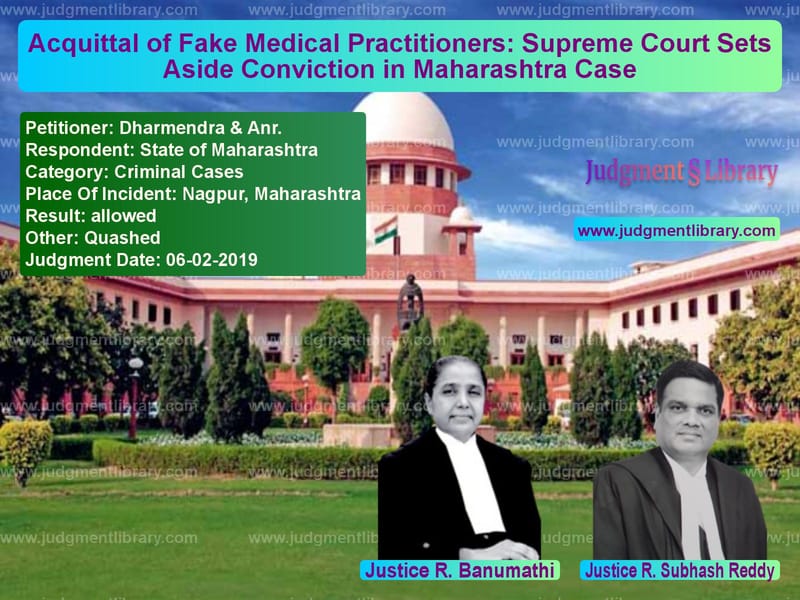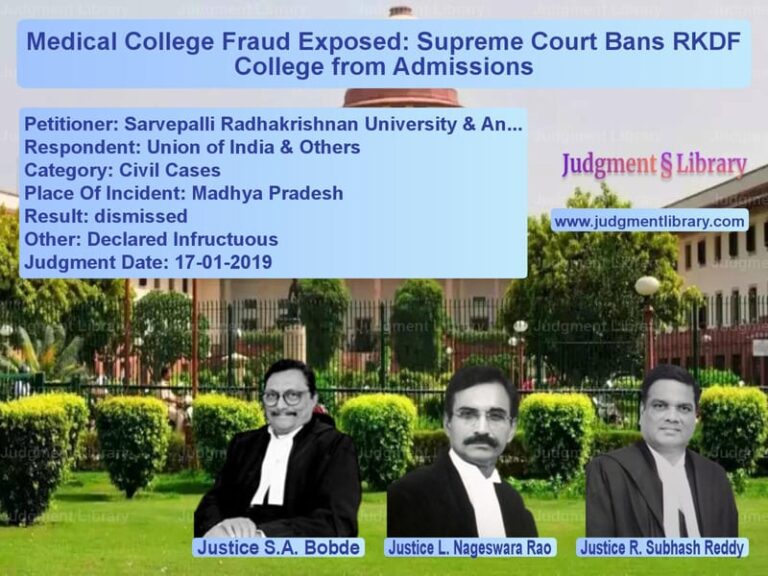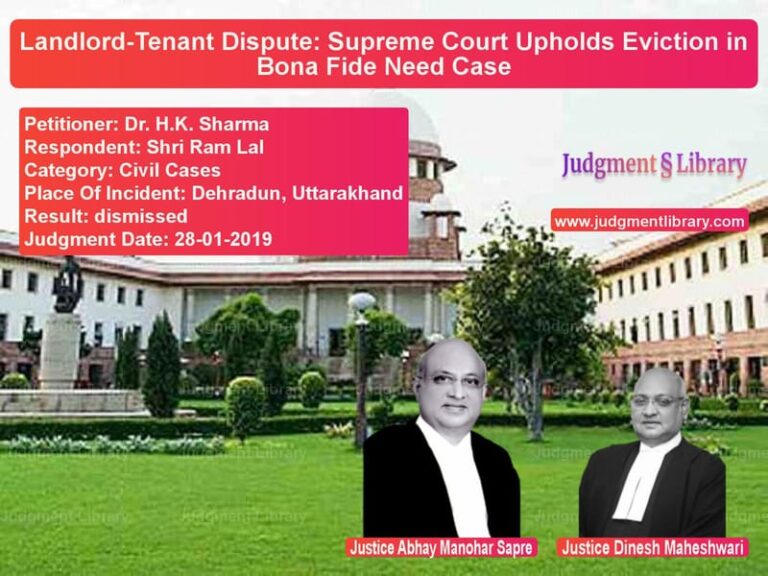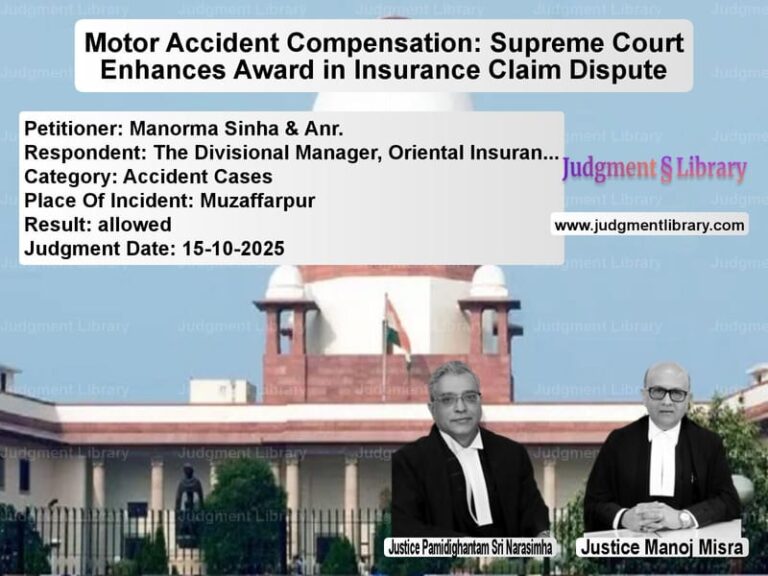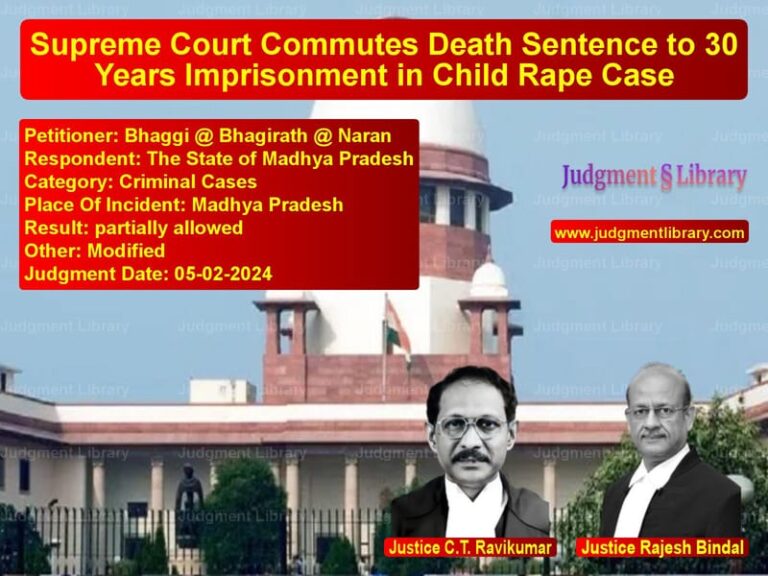Acquittal of Fake Medical Practitioners: Supreme Court Sets Aside Conviction in Maharashtra Case
The case of Dharmendra & Anr. vs. State of Maharashtra is a significant judgment in the domain of medical practice and the legality of practicing without a valid degree or certification. The Supreme Court’s decision in this case brings into question the integrity of the evidence used in convicting individuals accused of practicing medicine without authorization.
The appellants, Dharmendra and another individual, were convicted under Sections 33 and 36 of the Maharashtra Medical Practitioners Act, 1961, on charges of practicing medicine without possessing a valid degree or certification. The conviction was challenged, and after several appeals, the Supreme Court overturned the judgment, citing inconsistencies in witness testimonies and a lack of conclusive evidence.
Background of the Case
The case was initiated when law enforcement authorities received reports that Dharmendra and his co-accused were running an illegal medical practice at Hansapuri Road in Nagpur. Acting on this information, Police Sub-Inspector Kamalnayan organized a raid on April 16, 2004, sending a decoy patient, Yamuna Prabhakar Dekate (PW-6), into their clinic.
Upon receiving treatment and a prescription, the police raided the clinic, seizing medical records and arresting the accused. The trial court found them guilty, sentencing them to two years of rigorous imprisonment and fines. Subsequent appeals to the Additional Sessions Judge and the High Court of Bombay resulted in upheld convictions, leading the accused to escalate the matter to the Supreme Court.
Arguments by the Petitioner (Dharmendra & Anr.)
- The conviction was based on unreliable witness testimony, particularly that of the decoy patient.
- The evidence against them was circumstantial and lacked direct proof of unlawful medical practice.
- There was a pre-existing dispute with their landlord, suggesting a possible framing of charges.
- The prosecution failed to provide forensic validation of seized medical prescriptions.
Arguments by the Respondent (State of Maharashtra)
- The appellants were caught red-handed treating patients without a medical license.
- PW-6’s testimony confirmed that the accused prescribed medicines and applied bandages.
- The presence of medical supplies and prescription chits in the clinic supported the claim of illegal practice.
- The High Court had already reviewed and upheld the trial court’s findings.
Supreme Court’s Ruling
The Supreme Court closely examined the case and found several inconsistencies in the prosecution’s claims. The key witness, PW-6, admitted in cross-examination that she had no actual injury when entering the clinic. The Court observed:
“When she was not having any injury on her hand, it is unbelievable that the appellant-accused no.2 would still apply medicine on her and also put bandage. It is pertinent to note that even prescription chit Ex.32 which is stated to have been issued by the appellants has not been proved in accordance with law.”
- The testimony of the landlord’s family raised concerns about the motive behind the complaint.
- The seizure of medical items was not corroborated by a forensic report.
- The prosecution relied heavily on circumstantial evidence rather than direct proof of illegal practice.
Given these contradictions, the Court ruled:
“By considering the totality of the evidence and the material on record, we are of the view that the guilt of the appellants has not been proved beyond reasonable doubt and they are entitled to benefit of doubt.”
As a result, the Court set aside the conviction, acquitting the appellants of all charges.
Implications of the Judgment
This ruling has broad implications for cases involving allegations of unlicensed medical practice:
- Need for Stronger Evidence: Prosecution must provide forensic proof and direct witness testimonies rather than relying on circumstantial evidence.
- Protection Against False Allegations: This ruling highlights the importance of ensuring that personal disputes do not lead to wrongful convictions.
- Judicial Scrutiny on Investigations: Law enforcement agencies must conduct thorough investigations before filing charges.
- Impact on Medical Regulation: The judgment reinforces the need for clear legislative guidelines on identifying unauthorized practitioners.
In conclusion, the Supreme Court’s ruling sets a precedent for judicial scrutiny in cases involving allegations of illegal medical practice. It highlights the importance of evidence-based convictions and protects individuals from being wrongfully penalized based on weak or circumstantial claims.
Petitioner Name: Dharmendra & Anr..Respondent Name: State of Maharashtra.Judgment By: Justice R. Banumathi, Justice R. Subhash Reddy.Place Of Incident: Nagpur, Maharashtra.Judgment Date: 06-02-2019.
Don’t miss out on the full details! Download the complete judgment in PDF format below and gain valuable insights instantly!
Download Judgment: Dharmendra & Anr. vs State of Maharashtra Supreme Court of India Judgment Dated 06-02-2019.pdf
Direct Downlaod Judgment: Direct downlaod this Judgment
See all petitions in Fraud and Forgery
See all petitions in Judgment by R. Banumathi
See all petitions in Judgment by R. Subhash Reddy
See all petitions in allowed
See all petitions in Quashed
See all petitions in supreme court of India judgments February 2019
See all petitions in 2019 judgments
See all posts in Criminal Cases Category
See all allowed petitions in Criminal Cases Category
See all Dismissed petitions in Criminal Cases Category
See all partially allowed petitions in Criminal Cases Category

